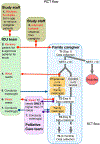Operationalizing needs-focused palliative care for older adults in intensive care units: Design of and rationale for the PCplanner randomized clinical trial
- PMID: 33007442
- PMCID: PMC7686302
- DOI: 10.1016/j.cct.2020.106163
Operationalizing needs-focused palliative care for older adults in intensive care units: Design of and rationale for the PCplanner randomized clinical trial
Abstract
Introduction: The number of older adults who receive life support in an intensive care unit (ICU), now 2 million per year, is increasing while survival remains unchanged. Because the quality of ICU-based palliative care is highly variable, we developed a mobile app intervention that integrates into the electronic health records (EHR) system called PCplanner (Palliative Care planner) with the goal of improving collaborative primary and specialist palliative care delivery in ICU settings.
Objective: To describe the methods of a randomized clinical trial (RCT) being conducted to compare PCplanner vs. usual care.
Methods and analysis: The goal of this two-arm, parallel group mixed methods RCT is to determine the clinical impact of the PCplanner intervention on outcomes of interest to patients, family members, clinicians, and policymakers over a 3-month follow up period. The primary outcome is change in unmet palliative care needs measured by the NEST instrument between baseline and 1 week post-randomization. Secondary outcomes include goal concordance of care, patient-centeredness of care, and quality of communication at 1 week post-randomization; length of stay; as well as symptoms of depression, anxiety, and post-traumatic stress disorder at 3 months post-randomization. We will use general linear models for repeated measures to compare outcomes across the main effects and interactions of the factors. We hypothesize that compared to usual care, PCplanner will have a greater impact on the quality of ICU-based palliative care delivery across domains of core palliative care needs, psychological distress, patient-centeredness, and healthcare resource utilization.
Keywords: Critical illness; Electronic health record (EHR) systems; Intensive care units; Mobile app; Palliative care; Randomized clinical trial (RCT).
Copyright © 2020 Elsevier Inc. All rights reserved.
Conflict of interest statement
Competing interests statement
No author has conflicts of interest to report relevant to this manuscript.
Figures
References
-
- S.o.C.C. Medicine, Critical care statistics in the United States, 2017.
-
- Wunsch H, Guerra C, Barnato AE, Angus DC, Li G, Linde-Zwirble WT, Three-year outcomes for Medicare beneficiaries who survive intensive care, JAMA 303 (2010) 849–56. - PubMed
-
- Guidet B, Leblanc G, Simon T, Woimant M, Quenot JP, Ganansia O, Maignan M, Yordanov Y, Delerme S, Doumenc B, Fartoukh M, Charestan P, Trognon P, Galichon B, Javaud N, Patzak A, Garrouste-Orgeas M, Thomas C, Azerad S, Pateron D, Boumendil A, Network I-CS, Effect of Systematic Intensive Care Unit Triage on Long-term Mortality Among Critically Ill Elderly Patients in France: A Randomized Clinical Trial, JAMA 318 (2017) 1450–1459. - PMC - PubMed
-
- Baldwin MR, Wunsch H, Reyfman PA, Narain WR, Blinderman CD, Schluger NW, Reid MC, Maurer MS, Goldstein N, Lederer DJ, Bach P, High burden of palliative needs among older intensive care unit survivors transferred to post-acute care facilities. a single-center study, Annals of the American Thoracic Society 10 (2013) 458–65. - PMC - PubMed
Publication types
MeSH terms
Grants and funding
LinkOut - more resources
Full Text Sources
Medical



